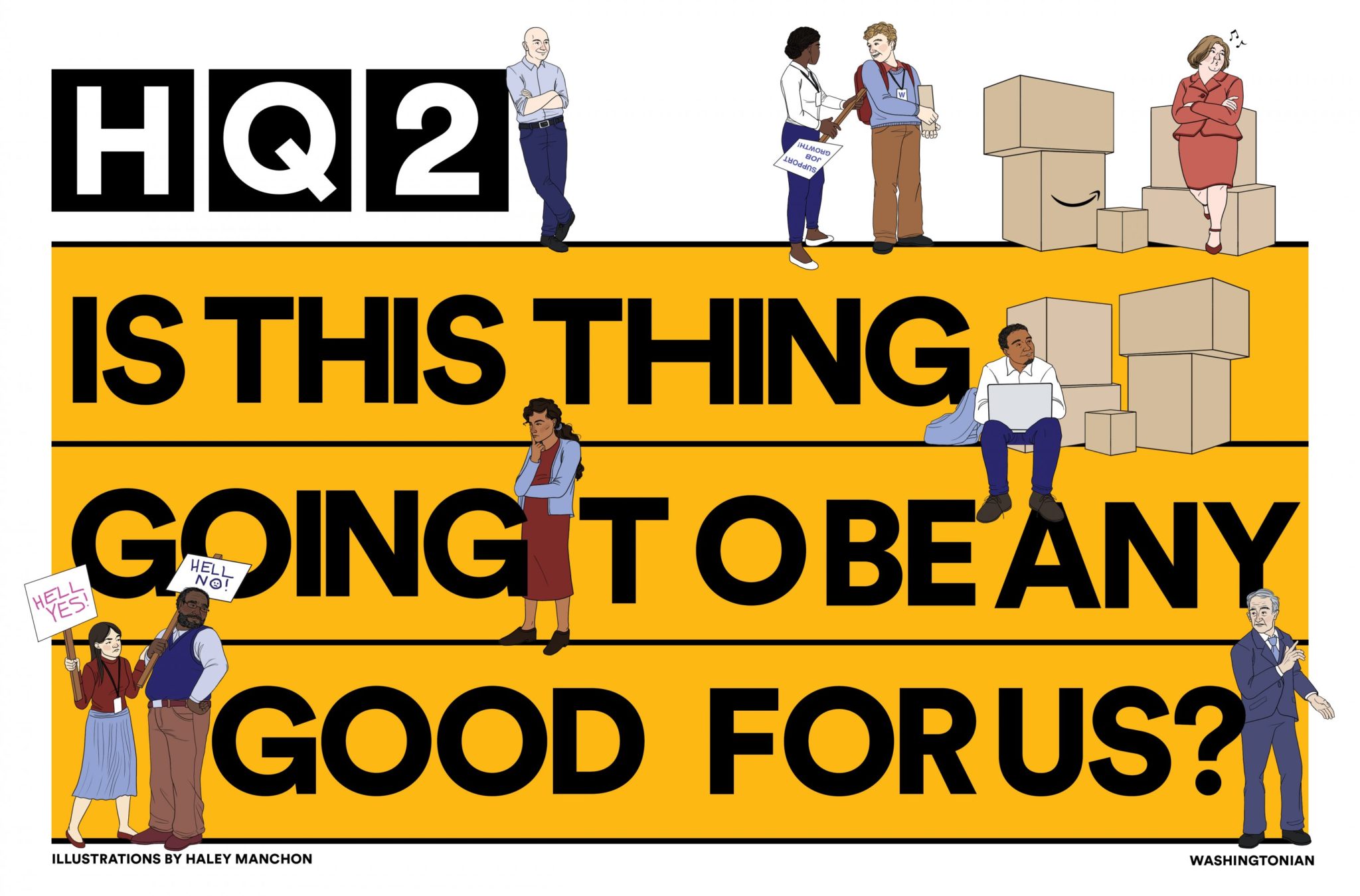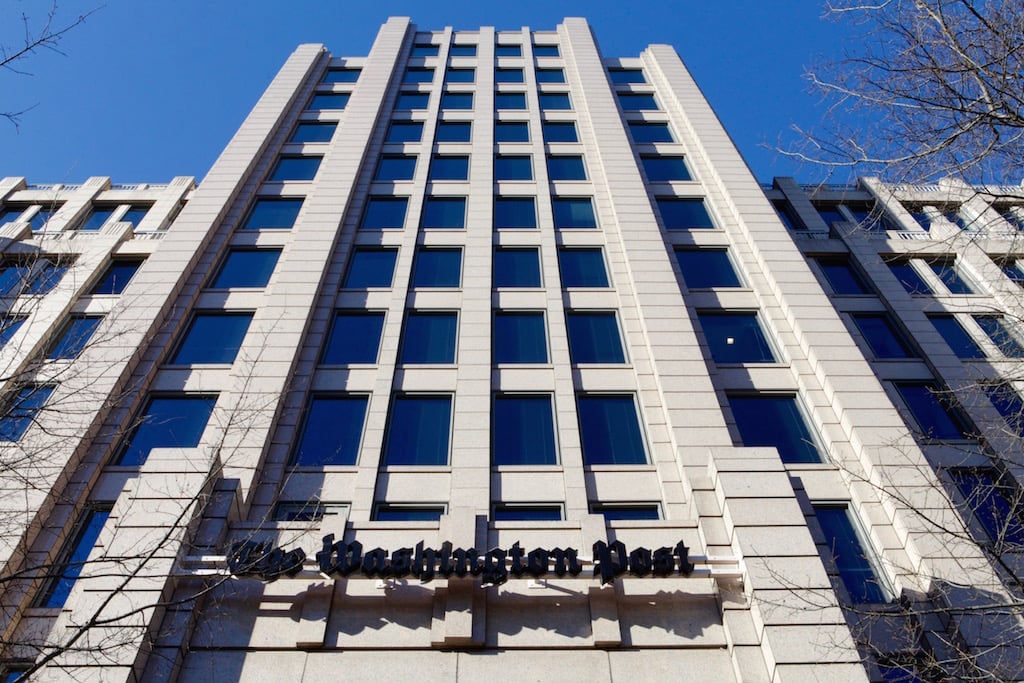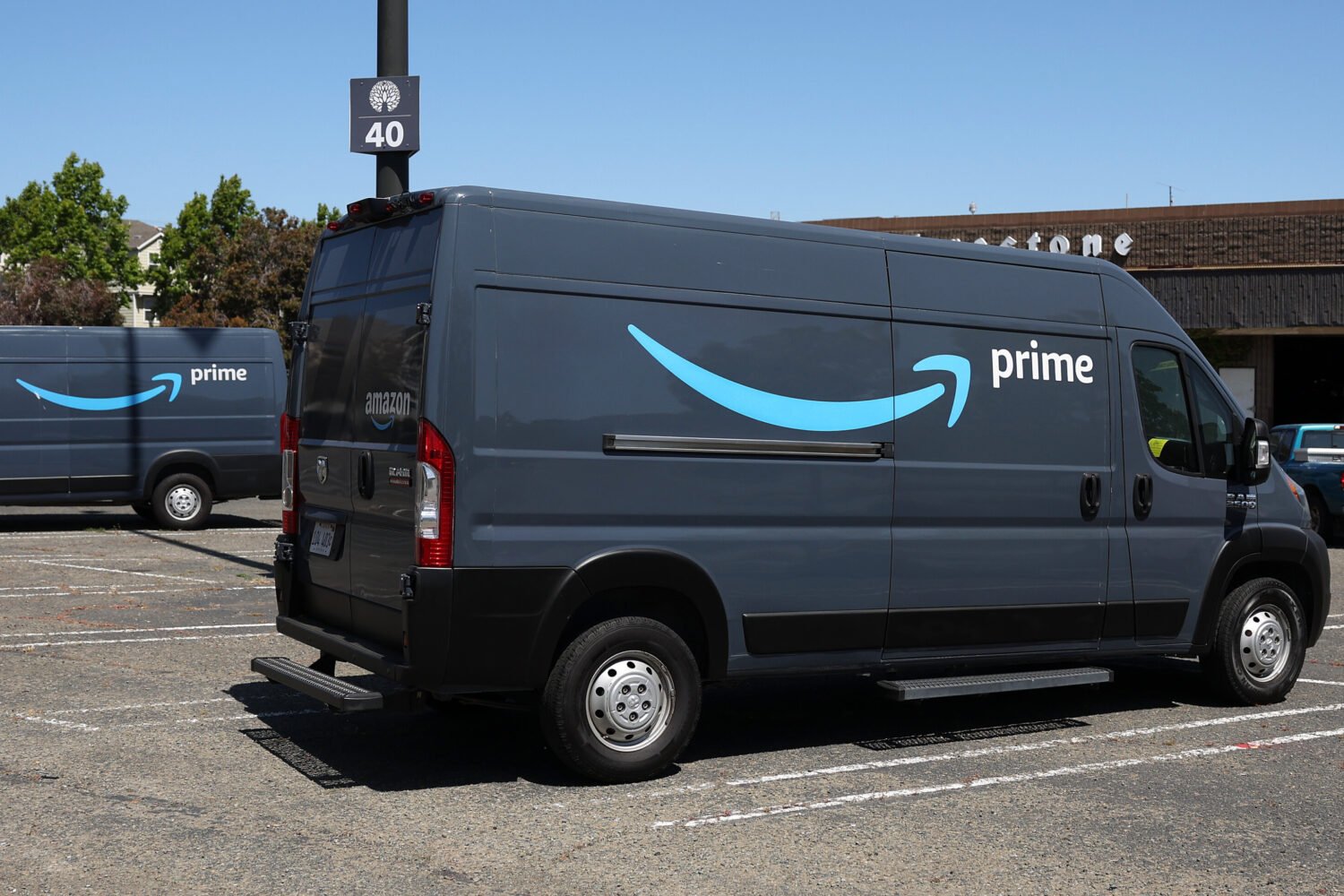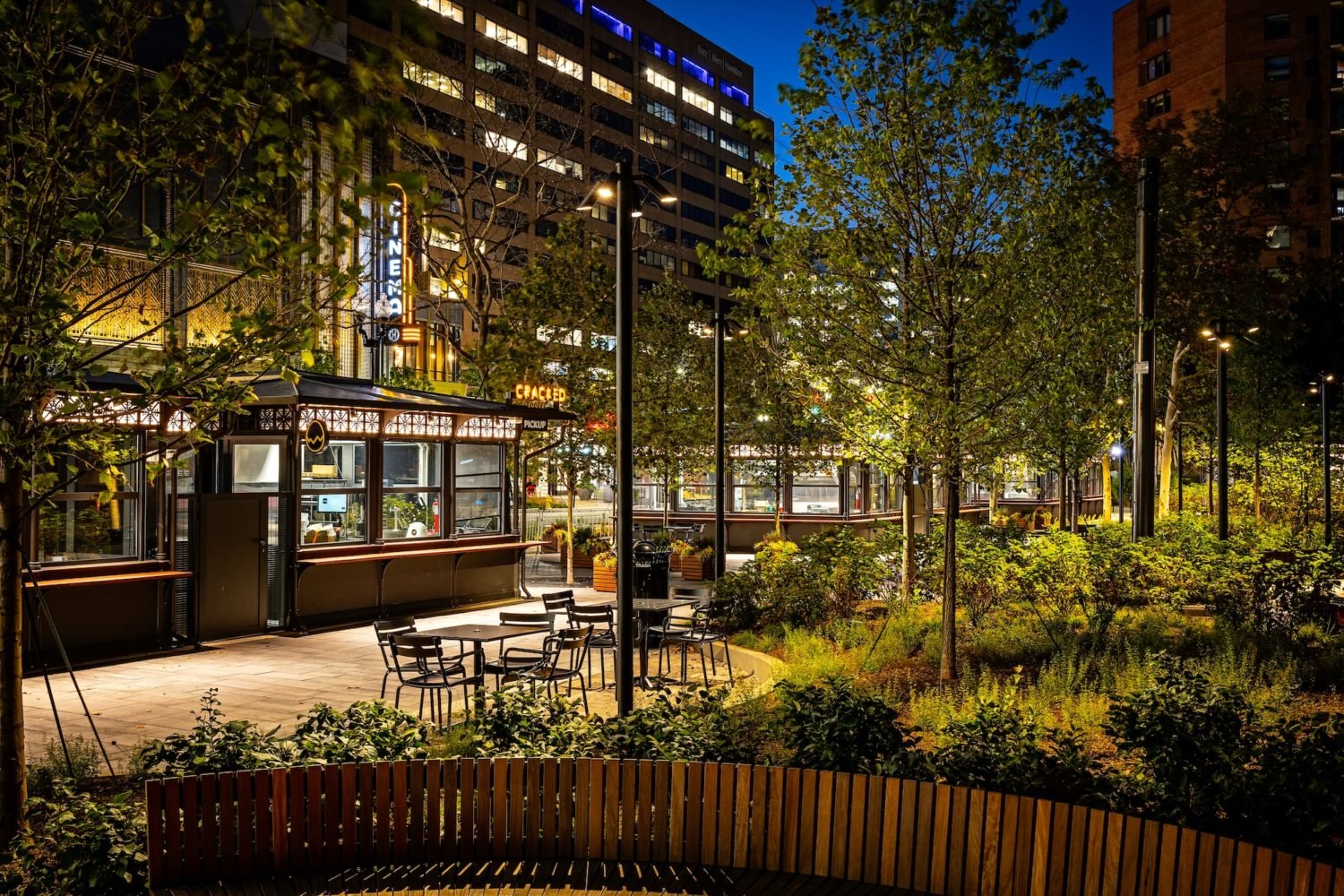It’s the topic that Washington—and a bunch of other places around the country—can’t stop talking about: Will Amazon bring its second headquarters to our corner of North America? But while boosters enthuse about how the area’s talent pool and civic infrastructure mean we deserve to win—and critics fume about the idea of tax incentives for a corporate behemoth—a simpler question is often ignored: Is this something we actually want? We asked people who should know and ranked their responses here from most to least enthusiastic.
Stephen Fuller
Director, Stephen S. Fuller Institute for Research on the Washington Region’s Economic Future
“There is a growing recognition that we can’t just be a company town. You put Amazon in the mix—this is a headquarters function. They say the average income is $100,000, maybe more, and there could be 5,000 people coming right away. Even that would be very meaningful. What that does is it counteracts what has been happening. From March 2017 to March 2018, we had 6,700 fewer federal workers. That loss of employment cost the economy $1.13 billion in economic activity. Our economy is struggling. We’ve been creating lower-value-added jobs—ones that are dependent largely on local spending to support them—in restaurants, personal services, retail sales—and we’re losing higher-value-added jobs because the federal sector has been shrinking and the federal-contracting sector hasn’t been growing.
“We haven’t even counted the vendors that support an operation like Amazon. All of the other jobs—there’s probably another 25,000 to 30,000 that are pretty good jobs, ranging from security to all the equipment servicing, the building management. Then the spending that these workers generate on Main Street within the local economy would be very helpful as well. On top of that, whoever gets Amazon then becomes visible to every other business, as in ‘If Amazon is in Washington, we should be there, too.’ This is good for us.”
Victor Hoskins
Director of economic development, Arlington County
“In terms of how it impacts our region, that impact is tremendously positive. If you think about what businesses do to press and push academic institutions to produce the next wave of workers, that will happen with an organization like Amazon coming here. The reason they’re looking in this region is there’s already a basis of talent here, and there’s also infrastructure that can be pushed to the next level.
“Roughly 55,000 net new jobs came to this region last year, okay? What was the impact of that? And that happened in one year. We’re talking about one-tenth that number a year, over a ten-year period [coming from Amazon]. In terms of the larger regional market with a workforce of 3 million and a population of 6 million, 5,000 jobs a year for ten years is not a big number. I think localized there may be some challenges. That means we need to think about these challenges now. There’s an affordable housing plan for 10,000-plus units in Arlington County. We’d need to execute that if they land here.
Brian Kenner
DC deputy mayor for planning and economic development
“We think the solicitation was written for us. The story that we told—the part of our proposal which is online—it’s an easy story for us to tell. We didn’t have to come up with having an amazing transportation network. We didn’t have to come up with the fact that we’re a fit city, or that we have green space, or that we have museums and restaurants. We didn’t have to manufacture any of that.
“Amazon has said this is going to happen over about 15 years. So if they announced tomorrow, as an example, it wouldn’t change much in terms of the feel of the city. In their original solicitation in September [2017], they said their first building was going to be at least 500,000 square feet. That’s not hundreds of thousands of employees and new families. So the change will be gradual.”
Heather Redman
Chair, Seattle Chamber of Commerce
“Amazon has been great for Seattle. A big tech company does big things quickly. It needs a government and a community that is excited and ready for that and willing to do its part to make the growth and excitement that Amazon brings work for a city as opposed to against it.
“If you can get organized to keep up, it’s really good. You get super-educated, smart, wonderful people from all over the world. They make nice but not ridiculous wages. They’re contributors to the community. They bring a lot of cultural diversity, a lot of brain power to solve hard problems, and you have this job-creation engine. In general, you should expect to get younger, more diverse across every sort of measurement of that, and also more geeky. You’ll also have a baby boom because a lot of Amazon employees are young. They get married and have children.”
Susan Tynan
Founder and CEO, Framebridge
“We think anything that makes DC more vibrant and more of a business town is a great thing. The knee-jerk reaction is it’ll make the market for talent more competitive, but in our experience, the more excitement happening in Washington, the better it is for us.
“We’d be excited to have a broader technology community, and one certainly that has a consumer bent to it as well. As we look to recruit talent from other cities, we always want Washington to look like a vibrant business town. When families move here to take a job with Framebridge, they may think, ‘Well what else is there?’ So the more happening here, the better.”

Andrew Altman
Managing principal, Fivesquares Development; former DC planning director
“We’re the developer of the Grosvenor Metro [area]. We spent two years with the Maryland National Capital Park and Planning Commission to get it rezoned from 500 units of housing to up to 2,000 units. We’re going to build a whole community there. There are lots of examples like that. White Flint—you could build thousands of units there. I think the positives far outweigh the negatives because the region can accommodate Amazon if we grow intelligently and sustainably. As a result, more housing will mean that pricing will be more affordable.
“The big takeaway to me, though, is it’s a huge boost to job creation, and job creation is fundamentally the core of what makes a place successful and viable. If Amazon comes in, it says a lot about us—that we’re competitive.”
Legand Burge
Professor of computer science, Howard University
“Definitely, having the headquarters here would be beneficial, at least to our students at Howard and many surrounding universities, especially when you talk about diversity. Obviously, we are a historically black institution. Having that right in our back yard, we could set up pipelines directly into Amazon.
“We actually send students to Amazon in Seattle. One thing many of my graduates say is that the Seattle area is beautiful, but they don’t see themselves staying there a long time—whereas if they had a location in DC, they may be more amenable to staying. It’s the retention piece.”
Robert Mandle
Chief operating officer, Crystal City Business Improvement District
“Obviously, there have been stubbornly high office-vacancy rates in Maryland and Northern Virginia. Whether it locates in Maryland, DC, or Virginia, it’s going to have an impact on vacancy, so that will be a huge positive. Anytime a new tenant comes in, it adds people on the street and a level of activation, and that’s certainly something that would be a positive for Crystal City.
“Amazon coming here would provide a net economic and social benefit. Transportation, affordable housing—these are issues we have whether they come or not. So having an opportunity to have a headquarters that supports our economy in a way that can provide the resources to address those things is something we need to understand. If you want to take Arlington, for example, we had a 6-percent decline in our commercial tax receipts, and that affected not only this year’s budget but the capital-improvement program. So thinking about the big picture, you need to be able to support economic development to support your priority agenda.”
Gwen Wright
Planning director, Montgomery County
“Having a major new employer come to this area is a good thing. I think certainly coming to Montgomery County would be a fantastic thing. We have had a lot of dependence in this part of the world on federal tenants, and we’ve all seen that the federal workforce is being reduced and dispersed a bit. I worked in Alexandria for five years before coming here as the planning director in 2013. We were all working hard there to keep existing office tenants and to attract new office tenants, and that has been a theme in Montgomery County.
Certainly, getting one large, signature business headquarters is a lot of employees in one fell swoop. But we have been planning and zoning for new employment for quite a while, so we believe we absolutely have the capacity to handle it. We’ve planned for the traffic, we’ve planned for the school capacity, we’ve planned for the infrastructure. I don’t think we would be caught off guard by anything.”
Stewart Schwartz
Executive Director, Coalition for Smarter Growth
“During the time they’ve been in the north end of downtown Seattle, both Amazon and the city have been able to maximize the number of people taking transit, walking, and biking and to minimize the number of auto trips. It’s good if they come here, if we continue to invest in transit in the region and in expanding transit. Also if it’s sited in a way that creates a good, walkable urban environment and has not just Metro access but a really strong transit network around it.
“We certainly made a very strong commitment—a historic commitment—this year with the $500 million in dedicated Metro funding. But it’s a bit of a mixed picture in terms of the level of commitment to transit beyond that. Looking at the glass half full, I’m hoping that if they announce for here, it will be a huge spur to doubling our efforts on transit in the region.”
Melissa Bondi
Mid-Atlantic state and local policy director, Enterprise Community Partners
“In the specific area where Amazon would choose to go, we’re going to see tremendous changes in the prices and speculation on prices for housing, and we currently don’t have any localities that have a really efficient market for producing housing for every income level and for all kinds of housing needs. It will also have a big impact on what kind of housing will be created to accommodate the perceived Amazon employee.
“So many public resources became available to help attract Amazon. What people have used to justify such a tremendous level of investment is to say that when you look at the return we get back, it’s a no-brainer. Let’s assume that’s true. The question is: Who benefits? I both hope and expect it will include a mix of local job seekers, businesses and business service providers, consultants, retailers, restaurants, and commercial landlords in our region who will have access to greater economic opportunities to build and expand their careers and footprint here. I expect it will benefit landowners large and small. I can’t say how it will benefit our neighbors who rely on core service delivery.”
Conor Gaughan
Manager, No Gay? No Way! campaign
“We think this is an opportunity and an obligation for Amazon to send a signal that if a community wants the biggest, best, most innovative companies, they’ve gotta be welcoming. They have to protect LGBT residents. We think this is a chance to elevate the discourse around non-discrimination legislation in the way we think it deserves.
“Our position is Amazon can affect more states, more positively by making it clearly part of the criteria. If they don’t, if they choose another direction [such as Virginia, which does not have strong LGBT protections] we should hope that they will then use the full weight of their power as one of the largest and most important companies in the world to push the state to do the right thing.”
David Zipper
Resident fellow, German Marshall Fund; Adviser to cities and start-ups
“Corporate attraction is a huge part of economic development in this region, especially in jurisdictions like Arlington, and there’s very little evidence that it leads to long-term economic growth.
“What’s shown to be far more likely to create a sustainable burst of economic growth is when you have a homegrown start-up that scales rapidly, hires lots of people, and ultimately makes a number of them rich when that company goes public or gets acquired. Those employees can then go on to become investors or mentors for other start-ups, or entrepreneurs themselves. Just like what happened with AOL in this region 25 years ago.
“What I worry about now is, with the HQ2 circus dominating the headlines and every economic-development conversation, that it crowds out strategies to support homegrown start-ups that in my view are the greater opportunity to provide the big bang in economic development that people are expecting HQ2 to deliver.
“The point is really about corporate attraction writ large vis à vis growing homegrown start-ups. We just happen to be in the midst of the most high-profile, well-managed—from a PR perspective—corporate attraction strategy in history. But all of them are relatively wasteful compared to homegrown start-ups.”
Tricia Romano
Seattle author and journalist
“Not to say that all tech workers are super-square, but they’re a certain kind of person. They’re a little more analytical. They’re not necessarily outgoing. They’re introverts. They’re on their phones. You go on dates with them and it’s like talking to a wall. There’s no engagement. When you introduce 35,000 programmers into a city, it just changes the feel. It changes the feel of when you go out.
“Lots of people think Seattle is awesome now because it’s got a million new restaurants and bars and really fancy apartments and lots of money flowing through. I wish we had more art, more music venues, more independent theaters. I’ve seen those things shrink. Whether the city gets lamer is not just about ‘Oh, we’re going to get a bunch of boring men.’ It’s about ‘Where are people who don’t make $90,000 going to live?’ A city can’t be an interesting place if it’s just one type of person and one type of income.”
Robert White
DC Council member (at large)
“I don’t know that we’re going to see as much of a benefit as some believe. You think of bringing 50,000 people to the District—that sounds good on paper, but DC now has a population of 700,000 and a median home-sale price of $582,000. When we had a population of 650,000, our median home price was $393,000. I’m a fifth-generation Washingtonian and one of the only members of my family not to be displaced from the city in the past 20 years. My father has been displaced, my brother, aunts, and uncles. So I’ve seen the impact that gentrification and development have had firsthand.
“It is one thing to build up an industry piece by piece. It is another thing to attract a behemoth that will have an outsize influence on our city, our politics, and our way of life, similar to the way the federal government does. We would be completely depending on Amazon and their whims.”
Amber Harding
Staff attorney, Washington Legal Clinic for the Homeless
“All I know is based on what’s happened to Seattle. I think that’s all anyone knows. Seattle did not use to have an affordable-housing or homelessness problem at all. It was not one of the big cities with those issues. Now they’ve had an increase in their homeless population of 47 percent since 2007 and rents have gone up 40 percent. Obviously, those two things are related.
“Then you take a city like DC that already has one of the highest homelessness rates in the country and some of the least affordable housing—I can’t imagine our government would have the ability to respond if our rents went up 40 percent in ten years. The things that we already don’t do well would get exacerbated.”
Monica Kamen
Codirector, Fair Budget Coalition
“The District has been growing very, very rapidly, investing in a lot of different economic development projects, and we’ve seen that the city has lost over half of its stock of affordable housing. It’s lost over 40,000 black residents, who’ve been economically displaced. And most people, I would say, in the District cannot really afford the cost of living here. So to imagine a company that’s just going to further increase housing prices, that’s going to spur gentrification in neighborhoods that maybe haven’t started experiencing it yet—that is very concerning.
Gentrification has impacted communities of color the most in the District. Amazon does not have a great track record around hiring diverse employees. If they’re going to be targeting mostly white, mostly millennial employees—and we’re already having a lot of white, well-educated, young people moving into the city—I think that will only increase with new job openings for Amazon here.”
Kshama Sawant
Seattle City Council member
“Should working people in every city aspire to decent jobs? Absolutely. But the problem is that under capitalism, the only terms on which these decent jobs are offered are that a few of us will get them, and then most of us will struggle for affordable housing even more than we did before, because of the avalanche of highly paid individuals, big developers, and land speculators. All of this is going to skyrocket the price of land and the rent of apartments. It’s going to be an exodus of working people from the city.
“What happens with HQ2 depends on how the political calculus works out. Do working people fight for something, or is the fate of that city going to be determined by government officials who are just throwing the red carpet down for Amazon?”
Franklin Foer
Author of World Without Mind: The Existential Threat of Big Tech
“I hate the fact that Jeff Bezos is hugging Washington so tight, because he’s probably doing it for all the wrong reasons. Silicon Valley began in the spirit of libertarianism, where they hated everything Washington stood for, but now that they’ve become monopolies, they’re kind of behaving like monopolies do, which is they try to protect themselves from government and try to exploit government.
“Amazon has been in the process of essentially merging with the federal government. It’s becoming one of the biggest contractors the government deals with. They power the government’s cloud. Not to mention that they have a monopoly in local news now through ownership of the Washington Post [Bezos owns the Post independently of Amazon]. So it just makes me bummed and a little terrified that the octopus is kind of extending its grasp to encompass this city.”
This article appears in the September 2018 issue of Washingtonian.















